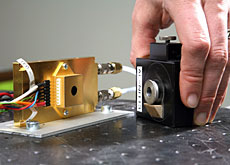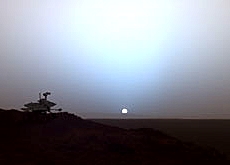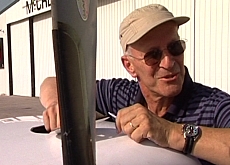Swiss lasers light up Mars mission

Lasers designed by a Neuchâtel firm will be looking for life on Mars as part of Nasa's 2009 mission to the red planet.
The state-of-the-art equipment will be carried on board a rover that is expected to spend two years conducting a range of experiments.
Known as the Mars Science Laboratory (MSL), the rover mission will be Nasa’s seventh exploration of the planet. One of the aims is to establish whether it has the necessary conditions to support life.
The quantum cascade lasers made by Alpes Lasers, a spin-off from Neuchâtel University, will be used to examine the chemical composition of various gases in the atmosphere and find out where they come from.
Scientists want to know whether the presence of gases, including methane, is the result of volcanic activity or biological processes. One of goals is to confirm the theory that methane on Mars is produced by microbes, as it is on Earth.
Exciting project
Antoine Müller, director of Alpes Lasers, told swissinfo that the tie-up with the Mars mission was the young company’s most ambitious and exciting project to date.
“Our laser will be generating light within the MSL’s spectroscopic system [which will analyse samples], enabling the whole system to work,” he said.
Müller said the company delivered a batch of lasers to Nasa at a cost of around $400,000 (SFr500,000) after being approached by the space agency’s Jet Propulsion Laboratory, which is building the rover.
The MSL will include a wide range of scientific instruments for identifying organic compounds such as proteins and amino acids that are essential to life, as we know it.
Using these tools, the rover will examine Martian rocks and soils in greater detail than ever before to determine the geologic processes that formed them. It also aims to determine the distribution and circulation of water and carbon dioxide, whether frozen, liquid, or gaseous.
Deep space
It is not the first time that Alpes Lasers, which was formed in 1998, has supplied lasers to Nasa. The company previously provided equipment for tests in the Earth’s stratosphere, but this is its first venture into deep space.
It will allow scientists to see how well the lasers perform in extreme conditions before moving ahead with more earthly applications.
“As they can measure molecular composition of gases, they can be used for any application where you want to verify the presence or the absence of some molecules,” said Müller.
“For example, when you use dangerous substances you may want a sensor that is capable of recognising it rapidly in case of a leak.”
Other potential applications include measuring the efficiency of catalytic converters or diagnosing illnesses from the air exhaled by patients.
swissinfo, Adam Beaumont in Geneva
Alpes Lasers is a spin-off from Neuchâtel University.
It supplies lasers mainly for environmental research.
But the company is seeing more and more interest from industry.
The Swiss National Science Foundation is supporting the laser project.

In compliance with the JTI standards
More: SWI swissinfo.ch certified by the Journalism Trust Initiative


You can find an overview of ongoing debates with our journalists here. Please join us!
If you want to start a conversation about a topic raised in this article or want to report factual errors, email us at english@swissinfo.ch.